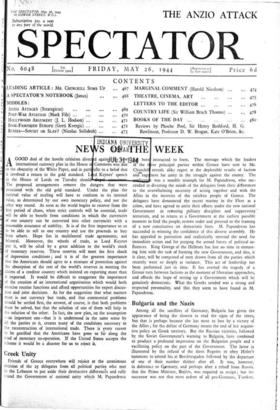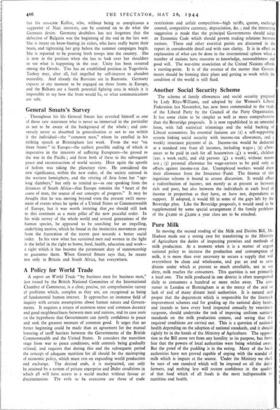Bulgaria and the Nazis
Among all the satellites of Germany, Bulgaria has given the appearance of being the slowest to read the signs of the times, but that is perhaps because she has most to lose by a victory of the Allies ; for the defeat of Germany means the end of her acquisi- tive policy on Greek territory. But the Russian victories, followed by the Soviet Government's warning to Bulgaria, have combined to produce a profound impression on the Bulgarian people and a vacillating policy on the. part of the Government. The latter is illustrated by the refusal of the three Regents to obey Hitler's summons to attend his at Berchtesgaden followed by the departure of one of their number thither after all. It was, however, in deference to Germany, and perhaps after a rebuff from Russia, that the Prime Minister, Bojilov, was required to resign ; but his successor was not that most ardent of all pro-Germans, Tsankov,
but his associate Kalfov, who, without being so conspicuous a supporter of Nazi interests, can be counted on to do what the Germans desire. Germany doubtless has not forgotten that the defection of Bulgaria was the beginning of the end in the last war. She is intent on brow-beating its rulers, who have really burnt their boats, and tightening her grip before the summer campaigns begin. She is reported to be pouring fresh troops into the country. She is now in the position when she has to look over her shoulders to see what is happening in the rear. Unity has been restored among the Greeks. Tito has an established position, in Yugoslavia. Turkey may, after all, feel impelled by self-interest to abandon neutrality. And already the Russians are in Rumania. Germany expects at any moment to be engaged on three fronts in Europe, and the Balkans are a fourth potential fighting area in which it is impossible to say how the front would lie, or what communications are safe.



























 Previous page
Previous page